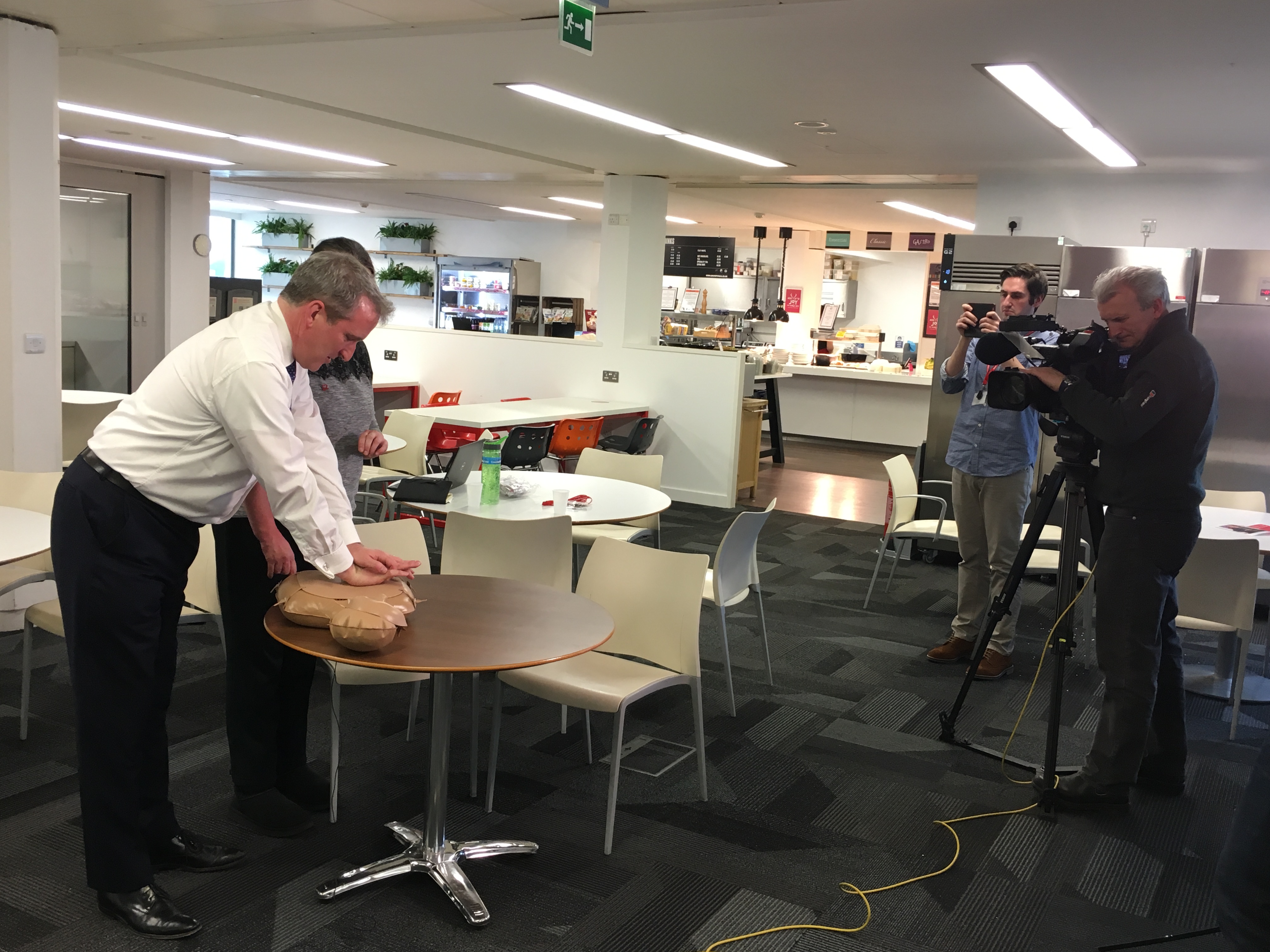
Today’s Education in the Media blog focuses on the plan for lifesaving skills to be taught in schools as well as the launch of the latest Get Into Teaching campaign. We also address the story on universities’ debts and music in schools.
Lifesaving Skills
Today, Thursday 3 January, we have published information on our plans for lifesaving skills to be taught in schools. The Education Secretary Damian Hinds appeared on Sky News Sunrise and ITV Good Morning Britain this morning , where he spoke about the plans and took part in a demonstration of CPR treatment. He also took part in short interviews with ITV News, LBC, TalkRadio and Bauer Media. In addition to the broadcast coverage on this, there was also print coverage from the Guardian, the Telegraph, the Daily Mail, the Times, the Independent, the Daily Star and the Sun.
CPR will be part of the secondary school health education curriculum, alongside basic first aid. Age appropriate Health education will also be taught in primary schools, covering all aspects of wellbeing through the course of a child’s time in school – from healthy eating and exercise, to mental health and first aid.
Education Secretary Damian Hinds said:
On arriving at university I was struck that the American students I met knew how to do CPR – and I didn’t have a clue. As a father I want my children to have the knowledge and skills they need to keep themselves safe and help others, and as Education Secretary I want that for every child.
Learning the basic skills of first aid and techniques like CPR will give young people the confidence to know that they can step in to help someone else in need and in the most extreme cases – it could potentially save a life.
That’s why we took the decision to include health education alongside relationship education for primary school children and relationship and sex education for secondary children. These subjects are a crucial part of our work to ensure children learn the wider skills they need to flourish in the modern world.
Get Into Teaching
Today, Thursday 3 January, the latest Get Into Teaching campaign was launched – entitled Itch to Switch. This story was covered in the Independent, the Times, the Daily Mail, the Mirror and the Express.
The campaign focuses on those seeking a change in career in the New Year, encouraging people to consider a career in teaching. Research has shown that 2 in 3 people would pick a different career if they could choose again, and that more than 2 in 5 of the public believe that they would make a good teacher.
Education Secretary, Damian Hinds, said:
Being at the front of the classroom is a life-changing experience and offers something that few other professions can – the chance to help shape a young person and their future. We have 450,000 teachers inspiring children every day in our schools and, if you are thinking of changing your job this new year, why don’t you join them and become a teacher.
The fact that 2 in 5 people think they have what it takes to be a teacher is fantastic and I want to give these people the opportunity to see what it is like standing in front of a class. As part of our Recruitment and Retention strategy we are working on a programme to help interested people discover what a joy teaching can be.
Music Education
Yesterday, Julian Lloyd Webber, Principal of the Royal Birmingham Conservatoire, wrote in the Times about concerns access to classical music is out of reach for children.
Given that the Department backs a number of initiatives to make sure a growing number of pupils have access to music education – including funding 45 bursaries for pupils to study at the Royal Birmingham Conservatoire through our Music and Dance Scheme - School Standards Minister Nick Gibb has written the following letter in response.
School Standards Minister Nick Gibb:
While I have the greatest respect for Julian Lloyd Webber, both as a musician and as principal of the Royal Birmingham Conservatoire, I must take issue with his comments on our record in arts education.
It is simply not true that most children from less privileged backgrounds are being shut off from music lessons.
Music is a compulsory part of the curriculum for five to 14-years-old and all primary schools can sign up to the Classical 100, a free resource developed by ABRSM, Classic FM and Decca, enabling young people to listen to 100 of the most influential pieces of classical music. Over 5,500 schools are already using this excellent resource, meaning it is potentially reaching hundreds of thousands of pupils.
And thanks to our network of 120 music hubs throughout the country, more than 700,000 children are being taught to play a musical instrument in whole classes - this is up 19% on 2013/14.
The hubs enable every child to play an instrument and provide instrument loans where this is necessary. In fact the arts are the second-highest funded element of the curriculum behind sport.
Through the Music and Dance Scheme we also fund 600 music bursaries for those with exceptional talent, including 45 at Mr Lloyd Webber’s own Conservatoire, as well as funding more than 500 places at specialist independent music schools like Chetham’s School of Music and the Purcell School.
Music and the arts are an essential part of a broad and balanced education and all children will have the chance to explore them as far as their talent or enthusiasm takes them.
Follow us on Twitter and don't forget to sign up for email alerts.